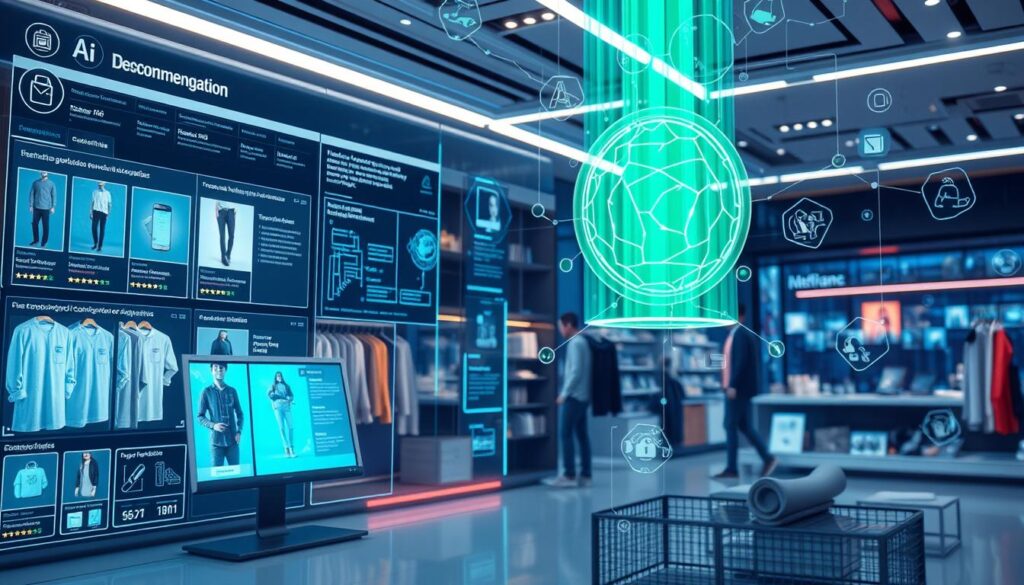In recent years, AI has changed how we shop online. It personalizes what we see according to our likes and actions. This smart tech looks at our online activities, like what we browse and buy. Then, it suggests products we might like.
Many stores are now using this tech to make shopping better. They aim to make customers happy, so they come back to shop more. A study with 100 people found that trusting a store makes them likely to buy again. This shows how AI can help build strong ties with customers.
Key Takeaways
- AI-driven eCommerce systems personalize product recommendations by analyzing customer behavior analytics.
- Machine learning in online shopping helps businesses understand and predict consumer preferences.
- Tailored product suggestions enhance customer experience and boost sales.
- A study showed that trust significantly impacts repurchase intentions in eCommerce.
- Akamai’s Q3 CY2024 sales in the eCommerce product recommendation sector reached $1.00 billion, demonstrating the market potential.
- Akamai’s gross margin was reported at 59.3%, highlighting the profitability of AI-driven technologies in retail.
- Management is forecasting a 1.3% year-on-year revenue increase for Akamai’s eCommerce sector next quarter, indicating steady growth.
The Role of AI in eCommerce
In the world of eCommerce, artificial intelligence (AI) plays a key role. Technologies like machine learning help predict what customers will buy. This makes online shopping better for everyone. By using AI, companies can offer more personalized service, boosting sales.
Understanding AI Technologies
Artificial intelligence includes many different tools. For example, machine learning improves as it gets more data. Neural networks work like our brains to spot patterns. And, natural language processing lets computers understand us better. These technologies are changing how we shop online.
Importance of AI in Online Retail
AI is vital in online shopping for many tasks. It helps manage stock and talk to customers better. By analyzing shopping data, companies can guess what we’ll buy next. This makes their services faster and keeps customers happy.
AI also lets shops offer custom service, building loyalty. It can spot trends in what we say about our shopping. This lets companies solve problems early, keeping our trust. With AI, businesses can keep up with trends and what we want, staying ahead.
Methods Used by AI for Product Recommendations
AI changes how products are recommended through advanced algorithms and filters. These methods give precise, personalized suggestions that improve online shopping. Let’s explore how AI achieves this.
Collaborative Filtering
Collaborative filtering uses data from user actions to suggest products. It looks at patterns in behavior and preferences across many users. This way, it offers products liked by similar users, improving personalization and eCommerce success.
Content-Based Filtering
Content-based filtering examines items a user has liked before. It focuses on item details like categories and tags, not on user similarities. This method makes personalized suggestions by matching item traits with those previously enjoyed, aiming at better eCommerce results.

Hybrid Recommendation Systems
Hybrid systems mix collaborative and content-based filtering. They combine the best aspects of both to overcome their limits. This approach leads to more precise, personal product tips, aiding eCommerce efficiency.
The Monetate’s Elevate 2024 client summit brought AI and industry leaders together. They discussed new personalization techniques using innovative algorithms. The event had over 150 guests, with insights from Asana and other big names like Nespresso and Vans.
| Award | Recipient |
|---|---|
| Personalisation Leader | Nespresso |
| Super Users | Giacomo Monti from Vans, Claire Ribiere from MyTheresa |
| Impact Award | Yoox |
| Program Champion | Britt Mansveld from Dr. Martens |
| Strongest Partner | adidas |
| Technology Partner of the Year | Contentsquare |
Recommendation algorithms, filtering techniques, and new personalization strategies are vital for online shopping. These AI-powered tools help companies offer better customer experiences and improve their results.
Personalized Product Recommendations
Personalized product suggestions are crucial in today’s online shopping. They make shopping better by matching products to what each person likes and needs. AI helps companies show products that fit well with individual customer’s preferences.
Enhancing Customer Experience
Personalized marketing is key to making shopping feel special for everyone. It uses data like what you’ve bought before to suggest new items you might like. This way, shopping online becomes more fun and satisfying.
People end up loving their shopping experience more. They keep coming back because they find what they’re looking for easily.
Boosting Sales with Personalization
Personalized suggestions really help businesses sell more. Companies like Nespresso and adidas have seen big wins by making shopping feel personal. Messages and deals are tailored, making folks more likely to buy.
Shopping becomes easier and more exciting, which means people spend less time deciding and more buying. This is great for both shoppers and businesses.
Brands like Vans and MyTheresa have used the Monetate platform to get amazing results. These wins show how vital personalization is in standing out online. As tech gets better, online shopping will keep getting more personal and better.
The Future of AI in eCommerce
The future of AI in eCommerce is filled with potential, thanks to AI trends and technology advancements. AI-driven helpers, augmented reality, and smart analytics will change how we shop online. These updates will help online stores understand what buyers want better, manage stock well, and blend online and offline shopping smoothly.
Using AI to create smart chat helpers will make shopping online more personal and fun. Customers will get advice and help tailored to their own needs. Also, augmented reality lets people see how products would look in their space before buying, making online and in-store shopping feel connected.
Predictive analytics plays a big part in the future of retail. It helps stores guess what buyers might want next by looking at data. This way, stores can be more organized, solve problems before they happen, and understand what customers feel and want better.
Stores that use predictive analytics well will see big benefits. They will make smarter choices, match up with trends, and offer better experiences to customers. Analyzing conversations can make things run smoother, help solve customer problems faster, and make customers happier.
To make these AI tools work well in eCommerce, there are steps to follow. Businesses need to set goals, pick the right AI tools, and use data smartly. At events like Elevate 2024, with big names like Nespresso, Dr. Martens, and adidas, the focus on these methods and teamwork stands out. Their success shows how AI can make shopping online better for everyone.
AI is making the future of retail exciting, with customization, quick service, and great customer interactions. As companies keep bringing in new tech, eCommerce will do more incredible things. It means an easier and more enjoyable shopping experience for everyone.
Conclusion
AI technologies are changing the online shopping world. They make product suggestions better and the shopping trip more personal. As these technologies grow, businesses using them will stand out.
AI’s influence is big. It changes how people shop and starts new trends in eCommerce.
Shopping online is getting more personal because of AI. It figures out what shoppers like. Then, it shows them products they would enjoy. AI is a key part of online shopping’s future.
Stores must use AI to keep up with the fast-paced market. With AI, businesses can give shoppers a great experience. They can do well in the market and raise the bar in their field.
AI’s role in changing shopping is clear. It makes shopping smarter, faster, and all about the customer.
FAQ
How do AI-driven product recommendation systems work in eCommerce?
What are the key technologies behind AI in online retail?
What is collaborative filtering and how is it used in eCommerce?
How does content-based filtering contribute to product recommendations?
What are hybrid recommendation systems?
Why is AI important in online retail?
How do personalized recommendations enhance the customer experience?
In what ways does personalization boost sales in eCommerce?
What is the future of AI in eCommerce?
Source Links
- https://link.springer.com/chapter/10.1007/978-3-031-71213-5_49
- https://finance.yahoo.com/news/akamai-nasdaq-akam-reports-q3-211056083.html
- https://techbullion.com/enhancing-customer-experience-with-ai-a-guide-to-implementing-conversational-analytics/
- https://techfundingnews.com/how-can-structured-coaching-drive-employee-development-and-success/
- https://chainstoreage.com/mcdonalds-tracks-success-geofencing-streamline-mobile-orders
- https://monetate.com/resources/blog/looking-back-at-elevate-2024-and-forward-toward-the-future-of-personalization/
- https://www.anthropic.com/customers/asana
- https://aws.amazon.com/blogs/apn/accelerate-mainframe-modernization-with-accenture-aws-and-generative-ai/
- https://medium.com/@shopping_saas/the-1st-person-dataset-a-personalized-shopping-revolution-0f9a75cb6503
- https://blog.creativememories.com/2024/11/07/the-official-guide-to-creative-memories-custom-cutting-system/
- https://blog.petrieflom.law.harvard.edu/2024/11/07/open-genomics-and-privacy-new-case-law-in-south-africa-affirms-a-key-principle/



